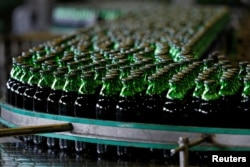In Vietnam, beer is big business.
Young people fill large, newly built beer halls for drinks after a long day. Foreigners are launching small businesses and making their own beer in the country. Foreign companies from Heineken to Sapporo hope the Vietnamese market will drive their sales growth. At the same time, some investors are looking for the chance to buy Sabeco, Vietnam’s top beer producer.
Beer seems to be popular nationwide, but the government is getting worried. Now government officials are considering ways to restrict advertising for beer.
The Ministry of Health has proposed a measure that would limit ads for beer, which it fears could soon become a threat to public health. The rules would ban roadside signs for beer, ads in films, on shows with children, and on social media.
Vietnam already bans ads for hard alcohol. But in countries that ban ads for beer and drinks known as spirits, drinking is 11 percent lower than in countries that mainly focus on hard alcohol. That information comes from Tran Thi Trang, deputy director of the Ministry of Health’s legislation department.
"Every year, the alcohol companies spend trillions of dong on advertising and marketing,” she was reported as saying. She added that beer manufacturers would not spend so much money if the ads truly failed to bring people to their products. Her comments appeared on the government’s news website.
Excited about beer
It is because of the fact the Vietnamese have developed a new love of beer that the Health Ministry proposed the restrictions on advertising.
In Vietnam, alcohol-related enjoyment is very old – from people who made their own rice wine to the American soldiers who loved 33 Beer, a locally made product, during the Vietnam War.
But today is different, as Vietnamese citizens in peace time have the growing wealth and freedom to drink beer into the early morning. Beer often costs less than a bottle of water.
Policymakers worry that as the drinking culture increases, so will Vietnam’s rates of alcohol-related health problems and drunk driving. The World Health Organization says the country already has a large number of cases of hepatitis B, the main cause of liver cancer.
Industry’s objections
“Beer and alcohol production play an important role in the development of the economy and society, noted Nguyen Van Viet, chairman of the Vietnam Beer, Alcohol, and Beverage Association.
Yet the WHO estimates that damage linked to alcoholic drinks can cost a country anywhere from 1.3-12 percent of gross domestic product (GDP). GDP is a measure of all the goods and services produced in a country over a 12-month period.
Officials aim to balance those costs with the benefits of beer to the economy, investment, and trade. Even Australia credits its beer-related exports whenever officials speak of improved trade with Vietnam, where it has become the biggest supplier of wheat and other products required to make beer.
Regan Leggett is the executive director for thought leadership at Nielsen, which released a report in March on discretionary spending in Vietnam and four other countries. He said beer and treats are not just fun, but represent the way the local economy is growing.
Beer is big business, and some Vietnamese are concerned new restrictions could affect the number of visitors. Trang, however, is not worried.
"If visitors come to Vietnam just because their country controls alcohol use, and Vietnam does not,” then Vietnam needs to rewrite its policies because drinking is an international practice.
I’m Susan Shand.
Ha Nguyen reported this story for VOA News. Susan Shand adapted the story for Learning English. George Grow was the editor.
Write to us in the Comments Section or on our Facebook page.
_______________________________________________________________
Words in This Story
hall – n. a large room of part of a building
focus – v. to direct one’s attention or effort on something
dong – n. the name for the money used in Vietnam
role – n. the position in society of a person or thing
benefit - n. things that are good for a person or society
discretionary – adj. additional, unneeded







